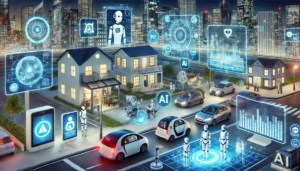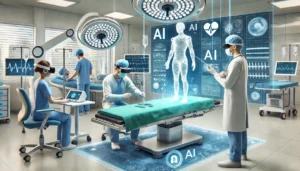Summary
The Future of AI in Everyday Life is shaping 2025 by making daily tasks smarter and more efficient. Artificial Intelligence (AI) in everyday life is revolutionizing smart homes, healthcare, education, transportation, and business. AI in everyday life enhances productivity and convenience, but challenges such as privacy risks, job displacement, and responsible development remain crucial concerns. As AI in everyday life continues to evolve, individuals and businesses must adapt to these advancements to stay ahead in an AI-driven world.

Introduction
Artificial Intelligence (AI) in everyday life is no longer a futuristic concept—it is transforming the way we live and work in 2025. AI-powered solutions are becoming an integral part of everyday life, offering convenience, automation, and efficiency. From smart home assistants and AI-driven healthcare to intelligent learning platforms and AI-powered business operations, this technology is reshaping industries. However, as AI in everyday life continues to evolve, ethical challenges, data privacy concerns, and employment implications need to be addressed. Understanding how AI in everyday life is impacting various aspects of daily life is crucial as we move into an increasingly automated world.
AI in Smart Homes
AI-Powered Virtual Assistants
Virtual assistants like Alexa, Google Assistant, and ChatGPT are becoming more advanced in 2025. These AI-driven assistants respond to voice commands, manage schedules, and provide real-time information. AI in everyday life integrates with smart home systems to control lighting, temperature, security, and entertainment, making homes more efficient and comfortable.
Smart Appliances and Home Automation
AI in everyday life is improving household appliances by making them more intuitive and energy-efficient. Smart refrigerators can track groceries and suggest recipes based on available ingredients. AI-powered robotic vacuum cleaners navigate homes more effectively, learning cleaning patterns. Home automation systems use AI to adjust heating, lighting, and security settings based on user habits, improving energy efficiency and convenience.
AI-Driven Home Security
Home security has advanced significantly with AI-powered surveillance cameras, smart locks, and facial recognition technology. AI-driven security systems analyze patterns to detect suspicious activities and send real-time alerts. AI in everyday life improves home safety by recognizing authorized individuals and automating access control.
AI in Healthcare

AI-Powered Diagnostics
AI in everyday life is revolutionizing medical diagnostics by analyzing complex data from medical scans, lab results, and genetic profiles. AI-based tools can detect diseases such as cancer, diabetes, and cardiovascular conditions with greater accuracy than traditional methods. This allows for early intervention and more effective treatment plans.
Personalized Treatment and Robotic Surgeries
AI in everyday life is making medical treatments more personalized by considering patient history, genetic data, and lifestyle factors. AI-driven robotic surgical systems perform minimally invasive procedures with high precision, reducing recovery time and surgical risks. Predictive analytics in healthcare helps doctors make better treatment decisions and optimize patient outcomes.
AI in Mental Health and Wellness
AI-driven mental health apps and chatbots offer therapy sessions, meditation guidance, and stress management techniques. AI in everyday life provides 24/7 emotional support, making mental health resources more accessible. AI-powered fitness trackers monitor physical activity, sleep patterns, and nutrition, offering personalized wellness recommendations.
AI in Education
Personalized Learning with AI Tutors
AI in everyday life is transforming education by offering personalized learning experiences. AI-driven tutors analyze student performance and adapt study plans based on individual strengths and weaknesses. This ensures that students receive targeted support and improve their learning efficiency.
AI-Driven Curriculum and Assessments
AI in everyday life helps educators develop customized curricula by analyzing student data. Automated grading systems use AI to assess assignments and exams, providing instant feedback. AI can also identify struggling students and suggest interventions to improve academic performance.
Virtual Classrooms and Immersive Learning
AI in everyday life enables virtual classrooms with real-time language translation, voice recognition, and interactive content. Augmented reality (AR) and virtual reality (VR) powered by AI create immersive learning environments, allowing students to explore complex concepts in an engaging way. AI-driven simulations and gamified learning enhance knowledge retention and engagement.
AI in Business and Workplaces
AI-Powered Automation and Efficiency
Businesses are leveraging AI in everyday life to automate repetitive tasks, streamline workflows, and improve efficiency. AI-driven chatbots handle customer inquiries, reducing the need for human intervention. AI-powered tools optimize inventory management, financial forecasting, and marketing strategies, helping companies make data-driven decisions.
AI in Human Resources and Hiring
AI in everyday life is revolutionizing recruitment processes by analyzing resumes, assessing candidate skills, and predicting job performance. AI-driven hiring platforms use natural language processing to evaluate interviews and match candidates with the right job opportunities. AI-based HR tools assist in employee engagement, performance tracking, and personalized training programs.
AI-Driven Decision Making
AI-powered analytics tools process vast amounts of data to provide actionable insights for businesses. AI in everyday life helps companies optimize pricing strategies, predict market trends, and identify potential risks. AI-enhanced customer relationship management (CRM) systems personalize interactions, improving customer satisfaction and loyalty.
AI in Transportation
Autonomous Vehicles and Smart Traffic Management
AI in everyday life is playing a crucial role in the development of self-driving cars, making transportation safer and more efficient. Autonomous vehicles use AI-powered sensors and algorithms to navigate roads, detect obstacles, and make real-time driving decisions. AI-driven traffic management systems analyze traffic patterns, optimize signal timings, and reduce congestion, improving overall road safety and efficiency.
AI in Ride-Sharing and Logistics
Ride-sharing platforms like Uber and Lyft use AI in everyday life to match passengers with drivers, optimize routes, and predict demand. AI-powered logistics and supply chain management systems improve delivery efficiency, reduce costs, and minimize delays. AI-driven warehouse automation enhances inventory tracking and order fulfillment.
AI in Entertainment and Media
AI-Generated Content and Recommendations
AI in everyday life is transforming the entertainment industry by generating music, art, and videos. Streaming platforms like Netflix and Spotify use AI algorithms to analyze user preferences and recommend personalized content. AI-powered content creation tools assist filmmakers, writers, and artists in developing innovative projects.
AI in Gaming and Virtual Reality
AI in everyday life is enhancing gaming experiences by creating intelligent NPCs (non-playable characters) and adaptive gameplay. AI-driven virtual reality (VR) and augmented reality (AR) applications provide immersive experiences, from realistic simulations to interactive storytelling.
Ethical and Social Implications of AI
AI and Privacy Concerns
As AI in everyday life collects and processes vast amounts of personal data, concerns over privacy and data security have increased. AI-driven surveillance and facial recognition systems raise ethical questions about mass data collection and potential misuse. Ensuring robust data protection policies and ethical AI development is essential for maintaining user privacy.
AI and Job Displacement
AI in everyday life automation is replacing some traditional jobs, raising concerns about unemployment and economic inequality. While AI creates new job opportunities, upskilling and reskilling workers will be crucial for adapting to an AI-driven job market. Governments and businesses must invest in AI education and workforce development programs to minimize job displacement effects.
The Future of Responsible AI Development
Ensuring responsible AI in everyday life development involves addressing biases in AI algorithms, promoting transparency, and implementing ethical guidelines. AI should be designed to benefit humanity while minimizing potential risks. Collaboration between policymakers, technologists, and researchers is necessary to create AI regulations that align with ethical standards.
Conclusion
AI in everyday life is transforming every aspect of daily life, from smart homes and healthcare to education, business, and entertainment. While AI offers significant benefits in automation, efficiency, and convenience, ethical challenges must be addressed to ensure responsible development. As AI in everyday life continues to evolve, individuals, businesses, and policymakers must work together to harness its potential while mitigating its risks. The future of AI in everyday life is here—are you ready to embrace it?